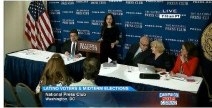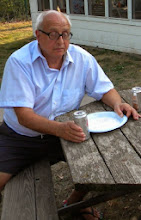http://www.press.org/news-multimedia/news/panel-finds-latino-electorate-expanding-turnout-declines
Panel finds Latino electorate expanding as turnout declines
November 3, 2014 | By Margaret Sands Orchowski | porchowski@hotmail.com
View on C SPAN 2. Seen live at 10 AM on October 31 at 10 AM
The Hispanic electorate is diverse and expanding but turnout of Latino voters on Nov. 4 looks at this point to be smaller than in 2012 and may not be decisive for either party.
These were some of take-aways from a National Press Club Newsmakers panel Oct. 31.
There are currently about 25 million eligible Hispanic voters in the U.S. but only about 8 million have registered to vote to date. In 2012, only 48 percent, or about 11 million, eligible Hispanic voters cast ballots; in 2014 the turnout percentage is expected to be even lower.
“One reason for lower turnout of Latino voters in 2012 and probably in 2014 is because of the dominance of youths in the Hispanic electorate,” Mark Lopez, director of the PEW Hispanic Center.
Not only do Latinos between the ages of 18-34 make up almost one third of the Hispanic electorate, 70 percent of all Hispanic youths are now born in the United States. This means a surge in the number of young potential voters into the future but it is also a universal problem that youths don’t tend to vote because they are very mobile, aren't that engaged in politics, are first-time voters and most are very busy, Lopez said. “Their political engagement will change as they get older," he added.
The Latino vote is still "punching below its weight," Lopez said.
The significance of the Latino vote is reduced because Hispanic voters don’t live in swing states: more than half live and vote in California and Texas so they don’t get the attention or have the impact that they would in a smaller state.
In 2014, Colorado, where about 14 percent of the electorate is Hispanic, is the only key state where the Hispanic vote might have an impact, Lopez said. In states like Georgia and North Carolina, only about 3 percent of the electorate are Hispanic.
"This too will change as the number of Hispanic citizens grows in states across the country,” Lopez said. “But turning a (solid Republican) state like Texas blue (Democratic), won’t happen overnight. It will take a long time, Maybe not until after 2020."
As for issues important to Hispanic voters, the panelists agreed that immigration reform was one among several.
“It’s important to the community, but I hear as much about health care and economic issues,” said Ruth Guerra, director of Hispanic media for the Republican National Committee. "Immigration issues drive the Latino vote but education, health and economic issues are equally important."
The Hispanic electorate is young, mostly born in the U.S. and is concerned about jobs and health care in the future, said Ester Aguilera, director of the Congressional Hispanic Caucus Institute.”
"Passing immigration reform will be important to both parties in 2016," said Peggy Orchowski, panel moderator and congressional reporter for the Hispanic Outlook .
"But if the Republicans dominate Congress, reform could happen in pieces not comprehensively," Orchowski said.
These were some of take-aways from a National Press Club Newsmakers panel Oct. 31.
There are currently about 25 million eligible Hispanic voters in the U.S. but only about 8 million have registered to vote to date. In 2012, only 48 percent, or about 11 million, eligible Hispanic voters cast ballots; in 2014 the turnout percentage is expected to be even lower.
“One reason for lower turnout of Latino voters in 2012 and probably in 2014 is because of the dominance of youths in the Hispanic electorate,” Mark Lopez, director of the PEW Hispanic Center.
Not only do Latinos between the ages of 18-34 make up almost one third of the Hispanic electorate, 70 percent of all Hispanic youths are now born in the United States. This means a surge in the number of young potential voters into the future but it is also a universal problem that youths don’t tend to vote because they are very mobile, aren't that engaged in politics, are first-time voters and most are very busy, Lopez said. “Their political engagement will change as they get older," he added.
The Latino vote is still "punching below its weight," Lopez said.
The significance of the Latino vote is reduced because Hispanic voters don’t live in swing states: more than half live and vote in California and Texas so they don’t get the attention or have the impact that they would in a smaller state.
In 2014, Colorado, where about 14 percent of the electorate is Hispanic, is the only key state where the Hispanic vote might have an impact, Lopez said. In states like Georgia and North Carolina, only about 3 percent of the electorate are Hispanic.
"This too will change as the number of Hispanic citizens grows in states across the country,” Lopez said. “But turning a (solid Republican) state like Texas blue (Democratic), won’t happen overnight. It will take a long time, Maybe not until after 2020."
As for issues important to Hispanic voters, the panelists agreed that immigration reform was one among several.
“It’s important to the community, but I hear as much about health care and economic issues,” said Ruth Guerra, director of Hispanic media for the Republican National Committee. "Immigration issues drive the Latino vote but education, health and economic issues are equally important."
The Hispanic electorate is young, mostly born in the U.S. and is concerned about jobs and health care in the future, said Ester Aguilera, director of the Congressional Hispanic Caucus Institute.”
"Passing immigration reform will be important to both parties in 2016," said Peggy Orchowski, panel moderator and congressional reporter for the Hispanic Outlook .
"But if the Republicans dominate Congress, reform could happen in pieces not comprehensively," Orchowski said.



No comments:
Post a Comment